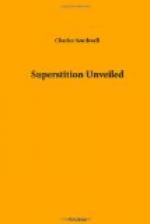Locke wrote rather disparagingly of ‘many among us,’ who will be found upon Inquiry, to fancy God in the shape of a man fitting in heaven, and have other absurd and unfit conceptions of him.’ As though it were possible to think of shapeless Being, or as though it were criminal in the superstitious to believe ‘God made man after his own image.’
That Christians as well as Turks ’really have had whole sects earnestly contending that the Deity was corporeal and of human shape’, is a fact, so firmly established as to defy contradiction. And though every sincere subscriber to the Thirty Nine Articles must believe, or at least must believe he believes in Deity without body, parts, or passions, it is well known that ‘whole sects’ of Christians do even now ’fancy God in the shape of a man sitting in heaven, and entertain other absurd and unfit conceptions of him.’
Mr. Collibeer, who is considered by Christian writers ’a most ingenious gentleman’, has told the world in his Treatise entitled ’The Knowledge of God,’ that Deity must have some form, and intimates it may probably be the spherical; an intimation which has grievously offended many learned Theists who considered going so far an abuse of reason, and warn us that ’its extension beyond the assigned boundaries, has proved an ample source of error.’ But what the ‘assigned boundaries’ of reason are, they don’t state, nor by whom ‘assigned.’ That if there is a God he must have some form is self-evident and why Mr. Collibeer should be ostracized by his less daringly imaginative brethren, for preferring a spherical to a square or otherwise shaped Deity, is to my understanding what God’s grace is to their’s.
But admitting the unfitness, and absurdity, and ‘blasphemy’ of such conceptions, it is by no means clear that any other conceptions of the ‘inconceiveable’ would be an improvement upon them. Undoubtedly, the matter-God-system has its difficulties, but they are trifles in comparison with those by which the spirit-God system is encompassed; for, one obvious consequence of faith in bodiless Divinity is an utter confusion of ideas in those who preach it, as regards possibilities and impossibilities.
The universe is an uncaused existence, or it was caused by something before it. By universe we mean matter, the sum total of things, whence all proceeds, and whither all returns. No truth is more obviously true than the truth that matter, or something not matter, exists of itself, and consequently is not an effect, but an uncaused cause of all effects.
From such conviction, repugnant though it be to vulgar ideas, there is no rational way of escape; for however much we may desire, however much we may struggle to believe there was a time when there was nothing, we cannot so believe. Human nature is constituted intuitively or instinctively to feel the eternity of something. To rid oneself of that feeling is impossible. Nature or something not Nature must ever have been, is a conclusion to which what poets call Fate—




